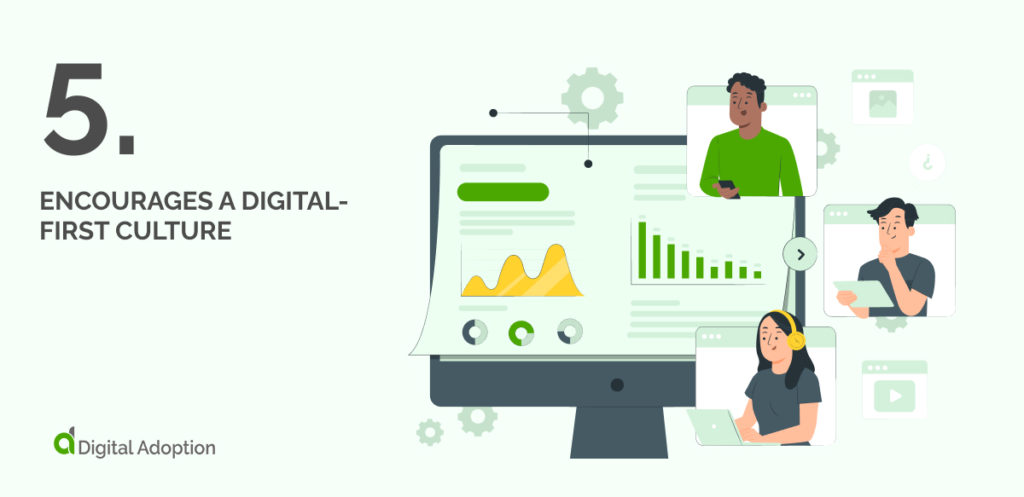The benefits of digital transformation are now well-known. Organizations worldwide can now see how established technologies can contribute to their profitability and success. Small startups can now access features that would have been a dream two decades ago.
But the excitement of digital transformation does not stop there. Every year, innovations, approaches, and applications all help businesses take their digital transformation journey in unpredictable ways. Applications of an old technological framework are not enough, and flexibility around technology is now crucial to driving business growth.
For years, global organizations have been making plans for digital implementation strategies. Large-scale digital transformations will become more visible than ever. For example:
- The 2020 UN roadmap for digital cooperation plans for integration across countries using new technology
- In 2022, the UK government revealed its three-year plan for wide-ranging digital transformation
- At the end of 2022, The EU program “A Europe Fit for the Digital Age” was planning dozens of specific legislative changes to accelerate digital transformation journeys across the continent.
Meanwhile, more industry-wide digital adoption changes will become clear. By 2025, the UK’s traditional copper phone lines will be switched off in favor of internet-based protocols.
This article will take stock of the current situation. It will remind us that digital transformation is an essential and functional concept. We’ll explain ten critical benefits of digital transformation and significant trends to look out for.
In the conclusion, the article will consider the future of digital transformation.
Digital transformation benefits CIOs & IT leaders should consider
The advantages of digital transformation are numerous and varied. For businesses, leveraging digital technologies can help reduce costs, improve operational efficiency, provide better customer service, create new revenue streams, and improve the customer experience. For employees, working more efficiently with digital tools can increase productivity and job satisfaction.
Businesses rolling out their digital transformation strategies can expect some of the following ten benefits:
1. More Extensive Data Collection

Digital transformation will help businesses to gather accurate and detailed data. With more information about customers’ buying journeys, staff engagement, and the company’s resources, organizations can leverage advanced data analysis to unlock the decision-making process.
2. More Effective Resource Management

Implementing organization-wide resource management exemplifies the advantages of digital transformation. Enhanced asset tracking, optimized resource allocation, and strategic planning bolster operational efficiency, simultaneously curbing costs.
This approach fosters adaptability, agility, and competitiveness in businesses. By harnessing digital tools and insights, companies can streamline workflows, mitigate resource wastage, and capitalize on opportunities swiftly. Embracing such practices not only modernizes operations but also fosters sustainable growth in a rapidly evolving business landscape.
3. Data-Driven Customer Insights

When it comes to customers, digital transformation creates many opportunities to monitor, process, and analyze data. Before businesses adopted digital solutions, the relevant information for data-based insights would be fragmented across many different systems and departments. Now, advanced CRM technology means that customer data can be efficiently contained in one place, combining personal customer information, social media metrics, and other information from across the business.
Businesses will have more opportunities to observe customer behavior, tailor their marketing solutions, and adjust their product offerings to suit their changing customer base. In doing so, they can improve customer retention and plan for sustained growth.
4. Enriched Customer Experience

Companies can use data from the customer’s buying journey to provide the services they need. With access to more accurate customer information, businesses can optimize communications and product offerings, offering individualized experiences that keep customers coming back.
5. Encourages A Digital-First Culture

A company that’s genuinely embraced its digital transformation will seek digital solutions at every opportunity. They don’t just use software to solve existing problems. Instead, they use innovative digital approaches to structure their work. Digital-first approaches are another method of keeping margins slim and staying ahead of the competition.
6. Higher ROI

On a small scale, digital transformation can be very cheap. But an all-encompassing digital transformation will incur high costs. Although CEOs and executive leaders are increasingly willing to take risks on digital solutions, they must be able to see how their investment of time and money will lead to results.
The ROI of the digital transformation strategy will be better than ever. With more opportunities to improve operational efficiency, limit human error, and enhance productivity, a company-wide digital culture can quickly implement fantastic results.
7. Better Operating Model

Large businesses can expect to dramatically reduce their operational complexity through digital adoption. Digital models can efficiently monitor performance and identify areas of improvement across the business. By eliminating redundancies and creating greater efficiency in operations, companies can increase their productivity and unlock growth potential. Additionally, with digital insights, companies can model multiple scenarios to predict outcomes and make informed decisions quickly.
8. Improved Agility

When done right, digital transformation is not an isolated set of practices. It represents a new agile mindset that empowers organizations to be highly resilient to change.
Detailed monitoring systems mean businesses can quickly detect and resolve unforeseen events and take advantage of unseen opportunities. And with emerging technologies creating new opportunities all the time, digital transformation allows organizations to integrate that technology into their workflows with ease.
Digital transformation encourages an agile approach that enables businesses to quickly keep up with the ever-changing market. Ultimately, this improved agility helps companies increase customer satisfaction and improve profits.
9. Enhanced Supply Chain Management

Each link in a supply chain may be simple. But every stage comes with its own set of risks, opportunities, and knock-on effects. Digital transformation solutions will take on logistics challenges, making it simple to accept deliveries, monitor inventory, and monitor dispatches.
Digital tools will help leaders to monitor their entire supply chain from a single platform.
By streamlining the transportation process, companies can reduce the risk of delays and enhance customer experience. The struggles of supply chain management may be hidden from customers, but the benefits are obvious. When companies can move goods faster at a lower cost, everyone wins.
10. Improved Competitive Advantage

A digitally transformed company’s competitive advantage comes from a powerful combination of all the benefits. The following areas are beneficial for finding a competitive edge:
- Efficient processes that allow them to work harder with less input
- Their ability to respond quickly, accurately, and proactively to customer needs, market trends, and changes in technology
- Effective internal employee systems that secure employee satisfaction and retention
As such, making digital transformation a central component of business strategy is in keeping with long-term business goals in a highly competitive marketplace.
Why Is Digital Transformation Important?

When a company decides to use new technologies to support its business processes, they are at the start of a digital transformation. When technology makes every single process more efficient, they have reached digital maturity. Although digital transformation may start small, only a few companies achieve digital maturity.
Digital transformation offers a range of benefits. It makes it easier for businesses to access data, measure customer behavior and create better products. It introduces the working practices that help companies to take advantage of new technology, create more efficient processes, and develop customer-centric services. It also helps ensure market longevity and competitive advantage by keeping up with customer demands.
When leaders embrace digital transformation across the entire organization, they are adjusting to a new way of thinking, forging new business strategies that will help them stay ahead of the competition in an ever-changing digital market.
What Will Digital Transformation Look Like In The Future?

Although the aims of digital transformation will not be radically different, businesses will increasingly set ambitious goals and comprehensive strategies to ensure the outcomes they need.
Today’s businesses know that digital transformation is essential for long-term growth, but the fundamental goals of digital transformation will not change. Companies worldwide will use digital solutions to achieve better value for all stakeholders, improved service for clients and customers, and a more favorable work environment for employees.
The stakes are higher than ever. Effective digital transformation will be increasingly important in an ongoing economic uncertainty. Companies adopting digital transformation initiatives will need to learn from past failures to ensure future success.
Companies are increasingly aware of the ambitiousness they need to secure an effective digital transformation. Leaders now know that digitally mature organizations need to attentively join up many specific approaches, using digital business models to change the way a company works. They will need to ensure measurable results for their innovative approaches, clearly demonstrating the benefits they are bringing.
In short, a robust digital transformation strategy will need to be front-and-center for any company seeking to implement new digital solutions.













